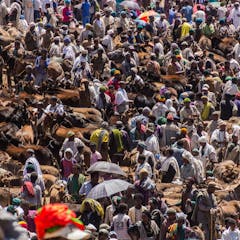
Articles on Population
Displaying 1 - 20 of 183 articles

Australia’s latest population projection figures have just come out. This is what they show about our demographics and where the country is heading in the future.

This service is a good first step towards a one-stop shop for easy access subnational statistics to understand local areas and how they’re changing.

Birth rates are falling – but the population in England will continue to rise.

Most of the problems confronting the world come down to population growth. But where women are given the choice, they limit the number of children they have.

Environmental policymakers and scholars must listen to sub-Saharan Africans’ voices and recognize the importance of population for achieving sustainable development goals.

In general, an ageing population puts added pressure on the working-age population to be more productive – just to maintain total output – amid growing fiscal constraints.

Deaths have exceeded births by 3 million over the past two years. China’s working-age population is set to plunge to one-fifth of its peak.

We look to politicians to provide climate change solutions, but there is only so much they can do. Beyond regulation, governments should remember the key role they play in promoting innovation.

Without policies that take account of a growing population with few working-age people, DRC risks seeing an increase in poverty and hunger.

With the right investment in health and education, Nigeria’s high population can spur economic development.

Ghana’s implementation of key population policies has not been consistent.

South Korea’s fertility rate fell below the level needed to sustain a population in the mid-1980s – and it never recovered. It is now below one child per woman during her reproductive years.

Many countries in West Africa do not have up to date census surveys.

During lockdowns renters ‘voted with removalists vans’, moving out of share houses and in with each other.

There’s no simple “yes” or “no” answer to whether we should produce more children when Earth is in such dire straits.

Evidence suggests that Ontario neither had a shortage of pre-authorized housing starts to accommodate its growing population, nor did it have a shortage of designated land to build such homes.

One scenario has China’s population halving by the end of the century, another has it falling by two-thirds.

For the first time since 1961, deaths in China have outpaced births – and unlike that one-year decline, the downward trend is likely to continue.

South Africans would rather see efforts go into tackling other challenges – but climate change will intensify those challenges.

Stricter population controls in India could have disastrous consequences for women and minority communities.
